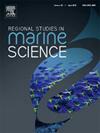Causation, impacts and mitigation strategies of typical marine ecological disasters in coasts of the South China Sea
IF 2.1
4区 环境科学与生态学
Q3 ECOLOGY
引用次数: 0
Abstract
In recent years, we have witnessed a significant increase in ecological disasters in the South China Sea, driven by a combination of climate change, marine pollution, and unsustainable resource exploitation. This paper analyzes the frequency of marine ecological disasters in the coasts of South China Sea, utilizing long-term statistical data and historical records to explore the connection between these events and various driving factors such as climate change and human activities. The findings indicate that eutrophication, overfishing, and global warming are the primary external drivers behind the noticeable rise in the frequency of marine ecological disasters in this area. Frequent phenomena include frequent clogging incidents at nuclear power stations due to the overproliferation of the Acetes chinensis and Creseise acicula, and a high proportion of jellyfish stings among all disasters, which have inflicted substantial economic losses on local fisheries, tourism, and energy supply security. In response to these challenges, the paper proposes scientific risk mitigation strategies, emphasizing the implementation of comprehensive management measures in ecologically vulnerable zones and during critical periods. These strategies not only provide a scientific basis for marine ecological management in the South China Sea but also offer references for other worldwide regions facing similar marine ecological challenges.
求助全文
约1分钟内获得全文
求助全文
来源期刊

Regional Studies in Marine Science
Agricultural and Biological Sciences-Ecology, Evolution, Behavior and Systematics
CiteScore
3.90
自引率
4.80%
发文量
336
审稿时长
69 days
期刊介绍:
REGIONAL STUDIES IN MARINE SCIENCE will publish scientifically sound papers on regional aspects of maritime and marine resources in estuaries, coastal zones, continental shelf, the seas and oceans.
 求助内容:
求助内容: 应助结果提醒方式:
应助结果提醒方式:


